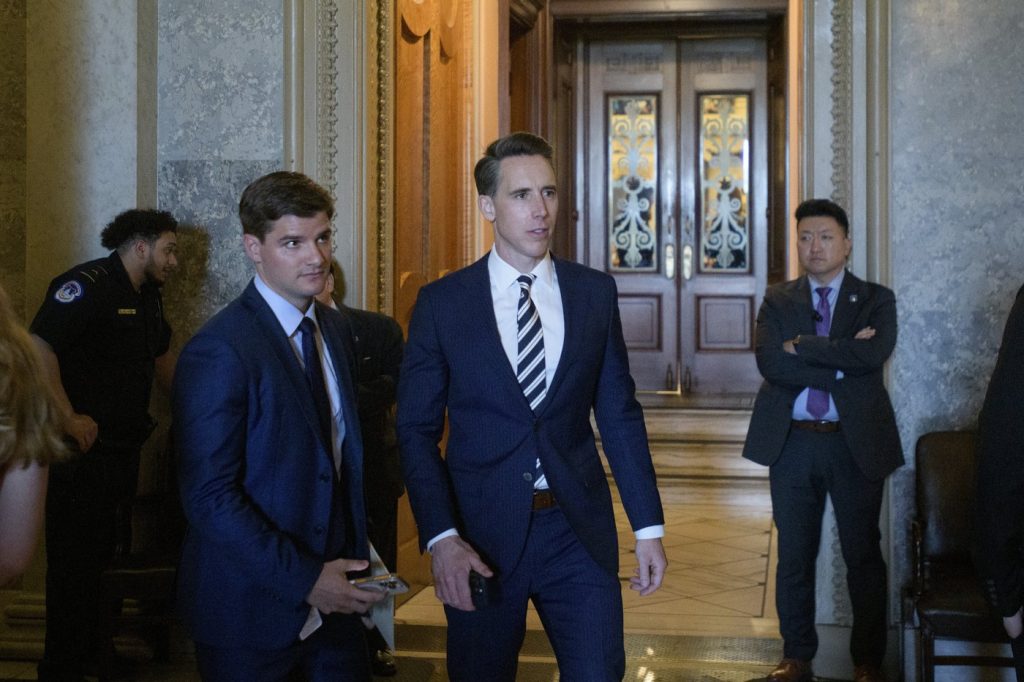WASHINGTON (AP) – Senator Josh Hawley, a Republican from Missouri, is dismissing President Donald Trump’s remark labeling him a “second-tier” senator. This comment arose following the recent bipartisan advancement of Hawley’s proposal aimed at banning stock trading by members of Congress, which also includes the president and vice president.
In an interview with Fox News on Wednesday, Hawley stated that being called “second-tier” was “not the worst thing” he had ever encountered, emphasizing that he had a “good chat” with Trump that clarified the bill's implications. The senator pointed out that there was a misunderstanding regarding Trump having to divest from his assets, specifically mentioning his Mar-a-Lago club.
This feedback from Trump is part of a trend where the president has been publicly criticizing senators from his own party in an attempt to rally support for his agenda. In a previous incident, Trump publicly chastised seasoned Republican Senator Chuck Grassley over a procedural issue concerning nominations. In a social media post, Trump called Hawley a “second-tier Senator” and accused him of aiding Democrats.
Trump's frustration partly stems from Hawley’s alignment with Democratic senators to push through the legislation aimed at curbing insider trading by lawmakers. This issue has been a point of contention as lawmakers often gain significant wealth while in office, with particular scrutiny arising during the COVID-19 pandemic when it was revealed many were trading on privileged information. Laws currently do not sufficiently prevent insider trading among elected officials.
Hawley’s proposition, in tandem with Democratic Senator Gary Peters from Michigan, successfully passed through the Senate's Homeland Security and Governmental Affairs Committee, reflecting a rare moment of bipartisan cooperation despite objections from other Republicans. While some GOP senators pursued amendments that would have exempted the president from the trading ban, these initiatives failed, with Hawley siding with the Democrats against them.
Trump also expressed displeasure that Hawley prevented the advancement of another amendment aimed at investigating stock trades made by Representative Nancy Pelosi and her husband, Paul Pelosi. Despite the scrutiny surrounding Paul’s trading habits, Pelosi’s office maintains that she does not personally hold stock. Hawley reiterated that Trump was supportive of measures that would ban stock trading by legislators, including Pelosi, arguing that it is time for Congress to act decisively on this issue.
Pelosi, for her part, has expressed her support for Hawley’s legislation, emphasizing the need for transparency among elected officials to ensure they are acting in the public's interest rather than for personal financial gain. Hawley and Peters outlined that their bill, called the Honest Act, aims to forbid stock operations by members of Congress, the president, and the vice president, as well as their spouses.
If enacted, the legislation would immediately bind elected officials from trading stocks and impose a 90-day restriction on any stock sales after the law comes into effect. Officials would be required to divest from covered investments by the beginning of their next term, effectively shielding the term-limited president from this requirement during his final term. Hawley echoed that this legislation could fulfill a long-held public demand to prevent lawmakers from benefiting from their unique access to information that impacts stock trading.
During the committee hearing, disagreements emerged among Republican senators as some proposed alternatives to the legislation. Senator Rick Scott from Florida sought to exempt the president and his close family members from the stock trading ban, but his amendments were defeated, with Hawley supporting the Democratic stance. Senator Ron Johnson from Wisconsin labeled the bill as “legislative demagoguery,” while asserting that existing laws provide sufficient oversight regarding insider trading.
As Trump’s criticisms widen, Grassley expressed feeling “offended” by the president's remarks that questioned his leadership and effectiveness within the Senate. This ongoing tension highlights the challenges faced by members of the GOP as they navigate their loyalty to the party's figurehead while also seeking to legislate responsibly.











